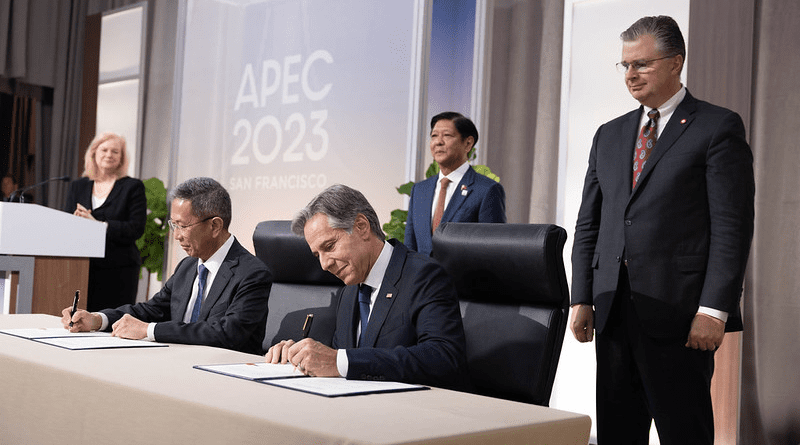US, Philippines Sign Nuclear Energy Cooperation Deal
By BenarNews
By Camille Elemia
The Philippines and the United States have signed an agreement to allow the export of U.S. nuclear technology and equipment to Manila for “peaceful uses” as the Southeast Asian country seeks alternative sources to meet climate goals and ensure energy security.
The Agreement for Cooperation Concerning Peaceful Uses of Nuclear Energy (the 123 Agreement) is the fastest ever negotiated by the United States, Secretary of State Antony Blinken said. The negotiation process began a year ago during the visit by Vice President Kamala Harris to the Philippines.
“The United States will be able to share equipment and material with the Philippines as they work to develop small modular reactors and other civilian nuclear energy infrastructure,” Blinken said during the signing ceremony on Thursday.
The U.S. Department of Energy reported that it had 23 agreements with 47 countries, the International Atomic Energy Agency and Taiwan as of Dec. 6, 2022.
Blinken and Philippine Energy Secretary Raphael Lotilla signed the document on the sidelines of the Asia-Pacific Economic Cooperation (APEC) summit in San Francisco. U.S. law requires it to be signed before transferring nuclear materials in compliance with international non-proliferation commitments.
Philippine President Fernando Marcos Jr., who witnessed the ceremony, said the deal would open doors for American companies “to invest and participate in nuclear power projects” in his country.
“We see nuclear energy becoming a part of the Philippine energy mix by 2032 and we would be more than happy to pursue this path with the United States as one of our partners,” he said.
Lotilla said the deal would allow cooperation involving “peaceful uses of atomic energy” such as fighting climate change, plant breeding, livestock production, insect pest control, water use efficiency, plastic waste disposal, food safety, health and medicine.
“Every step of the way, the agreement recognizes adherence to standards set by the International Atomic Energy Agency,” he said.
Blinken said that while peak energy demands in the Philippines were expected to quadruple by 2040, “nuclear power can consistently produce enough energy to meet communities’ critical needs without emitting more greenhouse gases.”
“In a nation of more than 7,000 islands, small modular reactors – some just the size of a city bus – can generate energy locally and conveniently.”
In addition to the 123 deal, Manila Electric Co. (Meralco) signed a cooperation agreement with the U.S.-based Ultra Safe Nuclear Corp. (USNC) to undertake a pre-feasibility study on a nuclear energy system using its proprietary Micro Modular Reactor.
Nuclear power in the Philippines
The new agreement is similar to one signed in 1968 by Marcos’ father and namesake, Ferdinand E. Marcos.
The late president, who ruled the country under martial law from 1972 to 1986, led the construction of the Bataan Nuclear Power Plant north of Manila. It was completed in 1984, just two years before his ouster, but was never activated because of safety concerns and corruption allegations.
The plant was constructed above a major fault line, which could lead to earthquakes.
On Thursday, the U.S. Geological Survey reported a magnitude 6.7 earthquake struck near Burias in the southern Philippines, about 640 km (397 miles) from the nuclear plant.
Earlier this year, the international organization Greenpeace opposed plans to use nuclear energy as an alternative power source, saying it is an “expensive and risky experiment.” The group called on Marcos to focus on renewable energy instead.
In May, Greenpeace campaigner Khevin Yu said any agreement would make Manila, Washington’s oldest defense ally in the region, a “guinea pig” for these technologies even as the country is abundant in safer and cheaper renewable energy.
“Risks related to nuclear technology remain unresolved. Small modular reactors are still untested and unproven and there is currently no way to safely store nuclear waste,” Yu said at the time.
“Even if they actually succeed in putting up nuclear plants, it will take a long time before we are able to use it. Furthermore, we will be stuck with maintaining a ticking time-bomb, which will endanger the lives of nearby communities should an accident occur,” he said.

